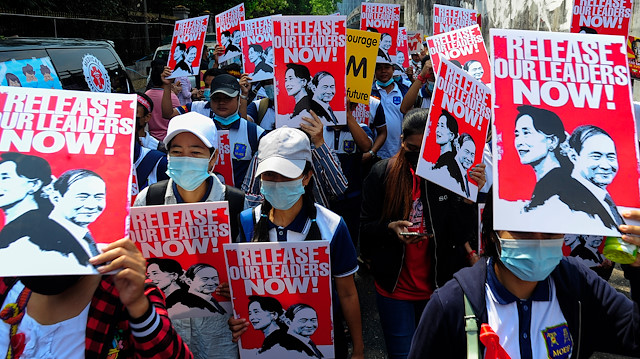
Military junta arbitrarily detains journalists, threaten others into hiding, say rights defenders
International rights defenders, journalists, and analysts expressed concerns over the worsening human rights situation in Myanmar following the Feb. 1 military coup overthrowing the democratically elected government.
Condemning the military junta's “widespread crackdown” on civilians, human rights activists, and journalists of the Southeast Asian state, rights defenders have called on the international community to take immediate action against the Myanmar army.
Comparing the current situation of Myanmar with “the Soviet-style repressive measures,” Maung Zarni, an exiled rights activist and scholar, said the Myanmar regime "is becoming more sophisticated in that it is not using lethal force against the Civil Disobedience Movement by ordering troops to shoot to kill”.
Referring to the 60 year-long practice of shooting directly over the protesters since the first coup of 1958 in Myanmar, he said: “Instead they are using night raids, kidnapping, intimidation, detention -- all under the cover of the night.”
The military also detained ousted President Win Myint, State Counselor Aung San Suu Kyi and hundreds of politicians along with senior members of the ruling National League for Democracy party.
- Military would not able to hide their offenses
Zarni, the co-founder of the Forces of Renewal Southeast Asia, a network of activists and scholars supporting democratic struggles, told Anadolu Agency that the daily internet cut from 1 a.m. till 9 a.m. local time "is designed to make sure the world is kept in the dark when they [the army] go around and arrest journalists, activists, and civil servants who abandon their posts and assignments to cripple the administrative and control mechanisms of the regime they consider illegitimate and unacceptable.”
He also condemned the Myanmar military regime for releasing 23,000 criminals across the country “to manufacture the pretext of looting, arson, riots, and anarchy.”
He, however, said that in the era of globalization and technology, the military would never be able to hide their offenses.
“The good thing is that even if journalists being detained or intimated, the Burmese people -- 90% of whom have mobile phones -- are acting as citizen journalists and documenters of rights violations and looming atrocities. Even without the internet, the Burmese are video recording everything.”
Terming the act of the Burmese military as against the “50 million citizen journalists,” Zarni said: “They [military] can kill people, but there will be mountains of evidence that will be compiled by the UN Independent Investigative Mechanism on Myanmar based in Geneva.”
“The generals have nowhere to hide or go from now on.”
A UK-based human rights organization in a released statement called on the international community to immediately launch "sanctions against the Burmese military, its business interests, cronies, and relevant family members.”
Terming the military as a “pariah government”, it urged the world communities to isolate the military regime from the rest of the world.
The statement has also urged for supporting the ongoing civilian movement in Myanmar. “The organizations and individuals leading the Civil Disobedience Movement [massive protests in Myanmar] must be supported, recognized, and aided as the legitimate response of the people’s will in response to the military’s coup,” said the London-based Burma Human Rights Network on Thursday.
- 'Draconian' amendment in law
The military regime in Myanmar on Feb. 15 amended the Electronic Transactions Law allegedly for “increasing their ability to surveil and prosecute” the ongoing civil movement, said the statement.
“The draconian amendment was suddenly announced […] to expand criminalization of communications and through vague language diminish the protection of user privacy,” it added.
It also called on the international community to immediately respond to the amended law.
“The military is clearly increasing the number of tools at its disposal to stifle opposition to their illegal seizure of power,” said the network's Executive Director Kyaw Win.
Win said the military’s reaction to the protest movement has become more volatile as protests gain momentum and more people join the country’s general strike.
“Protesters have faced water cannons, rubber bullets, and live ammunition, and sweeping arrests around the country,” he added.
- Journalists go into hiding
Speaking to Anadolu Agency, senior journalist and Editor-in-Chief of Yangon-based Development Media Group Aung Marm Oo said freedom of media and journalists in Myanmar is currently worse than ever.
“So the right to know information and the press freedom have been lost in Myanmar for long, and now even much worse than before after the recent military coup on Feb. 1,” Oo noted.
“We can say that the press freedom is already dead in Myanmar. That means there is no democracy and human rights at all.”
International human rights watchdog Fortify Rights in a separate statement on Thursday said: “The junta’s arrests and detentions of journalists have created a fearsome chilling effect on working journalists.”
It added that the military has arbitrarily detained journalists, threatened others into hiding, and dictated proposed legislation that would severely curb media freedoms.
“The junta arbitrarily arrested or detained at least nine journalists since Feb. 1 coup,” it said.
The military junta also dictated a raft of proposed legislation that would “severely restrict fundamental rights, including press freedoms,” the statement added.
“10 of our staff are now in hiding, including editors and reporters,” the statement quoted an editor-in-chief of a Myanmar media organization as saying.
The statement claimed that the rights body has documented “how several members of the press in the Yangon region, Rakhine State, and Kachin State went into hiding or avoided staying at their homes out of fear since the coup.”
“The international community must acknowledge that the military junta is not a legitimate government and has no authority to pass or amend legislation,” said Ismail Wolff, the regional director of the Fortify Rights.
Hello, the comments you share on our site are a valuable resource for other users. Please respect other users and different opinions. Do not use rude, offensive, derogatory, or discriminatory language.
The floor is all yours.








